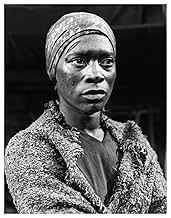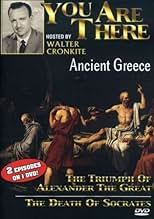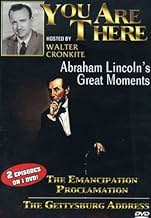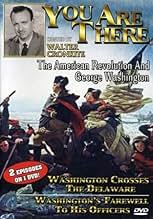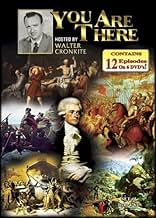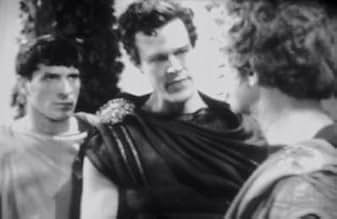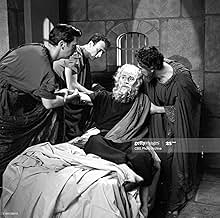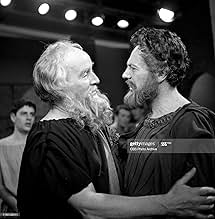Walter Cronkite hosted the reenactments of historical events. Shows included "The Landing of the Hindenburg", "The Salem Witchcraft Trials", "The Gettysburg Address", "The Fall of Troy", and... Read allWalter Cronkite hosted the reenactments of historical events. Shows included "The Landing of the Hindenburg", "The Salem Witchcraft Trials", "The Gettysburg Address", "The Fall of Troy", and "The Scuttling of the Graf Spee".Walter Cronkite hosted the reenactments of historical events. Shows included "The Landing of the Hindenburg", "The Salem Witchcraft Trials", "The Gettysburg Address", "The Fall of Troy", and "The Scuttling of the Graf Spee".
- Won 2 Primetime Emmys
- 3 wins & 4 nominations total
Browse episodes
Featured reviews
I somehow stumbled upon this looking at the bio of director John Frankenheimer, and thought I'd throw in a quick review, just to see if I can stir up anybody else's memory.
These "films" (and I use that term loosely) were shown to me in the mid-1960's during elem. history class, and they were about on par with the "Mr. Bungle" series Pee-Wee Herman used to feature on his show. Each black and white episode was introduced by Walter Cronkite "embedded" right in the middle of some historical event, and it was all downhill from there. Bad acting eliciting snickers and catcalls from 3rd graders is most-likely not something Mr. Frankenheimer featured prominently on his resume', but he was probably more proud of these than THE ISLAND OF DR. MOREAU!
These "films" (and I use that term loosely) were shown to me in the mid-1960's during elem. history class, and they were about on par with the "Mr. Bungle" series Pee-Wee Herman used to feature on his show. Each black and white episode was introduced by Walter Cronkite "embedded" right in the middle of some historical event, and it was all downhill from there. Bad acting eliciting snickers and catcalls from 3rd graders is most-likely not something Mr. Frankenheimer featured prominently on his resume', but he was probably more proud of these than THE ISLAND OF DR. MOREAU!
I noticed the one user comment about this show, about seeing it in elementary school in the 1960s. That person seemed to feel the acting wasn't up to par and kids were not too interested.
I remember the series as a teenager in the 1950s when it was on the air for real. Our whole family would watch this show together, and we were as I recall fascinated by it. I distinctly recall one of the shows was on the death of Socrates which even to this day must affect me in some way. Here I was, a teenager, thoroughly bored with history in school, being fascinated by the way it was portrayed right in front of us. Poor acting? I don't remember that - knowing CBS at the time, it was probably as good as anything else being shown on the little black and white tube.
In thinking back on this, I really think it was amazing that this serious - and important - subject could be shown in the way it was. Today's programming is dumbed down stuff compared to the plot lines and staging that were done back then. I think we are the poorer for the lack of good programming that is available on prime time for our kids - programming that is presented as a serious prime time program, not as a History Channel feature that the kids would never be caught dead watching.
I remember the series as a teenager in the 1950s when it was on the air for real. Our whole family would watch this show together, and we were as I recall fascinated by it. I distinctly recall one of the shows was on the death of Socrates which even to this day must affect me in some way. Here I was, a teenager, thoroughly bored with history in school, being fascinated by the way it was portrayed right in front of us. Poor acting? I don't remember that - knowing CBS at the time, it was probably as good as anything else being shown on the little black and white tube.
In thinking back on this, I really think it was amazing that this serious - and important - subject could be shown in the way it was. Today's programming is dumbed down stuff compared to the plot lines and staging that were done back then. I think we are the poorer for the lack of good programming that is available on prime time for our kids - programming that is presented as a serious prime time program, not as a History Channel feature that the kids would never be caught dead watching.
Hosted by Walter Cronkite before his bigger successes, "You Are There" created something totally new for television - a reporter with a camera and microphone who covered historical events as though they were breaking news.
One example was, "The Assassination of Julius Caesar." He interviews many of the people who took part as they stand over Caesar"s body.
"Excuse me, sir," he asks Marc Antony. Antony takes a moment to be interviewed. What a fascinating concept.
The only other episode I remember seeing live was, "The Capture of Jesse James," with an unknown James Dean in the title role.
If the episodes have not been lost, they should be put on DVD for today's generation to watch.
One example was, "The Assassination of Julius Caesar." He interviews many of the people who took part as they stand over Caesar"s body.
"Excuse me, sir," he asks Marc Antony. Antony takes a moment to be interviewed. What a fascinating concept.
The only other episode I remember seeing live was, "The Capture of Jesse James," with an unknown James Dean in the title role.
If the episodes have not been lost, they should be put on DVD for today's generation to watch.
One of the interesting footnotes to this New York-based show from the 1950s was that it became a sort of refuge for blacklisted scriptwriters. Walter Bernstein and Abe Polonsky are mentioned in the extended IMDb credits as "uncredited" writers. Some of the Hollywood blacklist histories mention this series as employing blacklisted writers.
I think it was Polonsky (whose FORCE OF EVIL is arguably one of the best of the film noirs) who talked about his "You Are There" experiences at a panel I attended in Berkeley in 1980. He stated that many of the historical episodes covered in the series were about the suppression of dissidents (such as The Death of Socrates), mirroring what the leftist screenwriters felt about being blacklisted from their industry on the basis of their political beliefs and affiliations.
I watched "You Are There" occasionally as a kid growing up in the 1950s, and of course I had no sense of this context. I remember thinking the shows were interesting--but corny. But I cannot compare the effort to penetrate historical events with anything currently on commercial broadcast network TV, and the CBS effort behind "You Are There" was a laudable one, in a different age.
I think it was Polonsky (whose FORCE OF EVIL is arguably one of the best of the film noirs) who talked about his "You Are There" experiences at a panel I attended in Berkeley in 1980. He stated that many of the historical episodes covered in the series were about the suppression of dissidents (such as The Death of Socrates), mirroring what the leftist screenwriters felt about being blacklisted from their industry on the basis of their political beliefs and affiliations.
I watched "You Are There" occasionally as a kid growing up in the 1950s, and of course I had no sense of this context. I remember thinking the shows were interesting--but corny. But I cannot compare the effort to penetrate historical events with anything currently on commercial broadcast network TV, and the CBS effort behind "You Are There" was a laudable one, in a different age.
I truly can't say given the times and context of its original broadcast, but I must say I enjoy my fortuitous introduction to some remastered episodes from the Fifties of this CBS News production.
If they're not "live TV" they're certainly kept "in-camera" at the credited Hal Roach Studios. They had to have been filmed quickly too.
Besides a youthful Walter Cronkite (yes, I remember him) sitting behind a desk with a huge microphone to one side, clutching a thick script, and providing two intros and a summary in his inimitable style, we hear off-camera radio announcers handing off to each other in the traditional style as the "reporters on the scene".
We also watch the historical figures blithely if not gladly address "the fourth wall" in response to the reporters' questions. You'll recognize some faces, some to become famous and others as the established character actors that you'll need this database to help identify.
Judge the writing for yourselves, though keep in mind what can only be inferred as the goal. Each episode depicts an historical calendar date, a nice newsbeat touch that Cronkite partly resolves in his summary. The end credits include a disclaimer that everything "is based on historical fact and quotation." With CBS News in charge viewers could have no doubt of that.
Jack Pierce does makeup...recognize him? And some images linger, among them rocks and snowballs bouncing off the bewigged head of "Roy" Randell during the Boston Massacre and railings very nearly giving way in any age...
...but this was indeed the Golden Age of Television. I award an extra vote for audacity.
If they're not "live TV" they're certainly kept "in-camera" at the credited Hal Roach Studios. They had to have been filmed quickly too.
Besides a youthful Walter Cronkite (yes, I remember him) sitting behind a desk with a huge microphone to one side, clutching a thick script, and providing two intros and a summary in his inimitable style, we hear off-camera radio announcers handing off to each other in the traditional style as the "reporters on the scene".
We also watch the historical figures blithely if not gladly address "the fourth wall" in response to the reporters' questions. You'll recognize some faces, some to become famous and others as the established character actors that you'll need this database to help identify.
Judge the writing for yourselves, though keep in mind what can only be inferred as the goal. Each episode depicts an historical calendar date, a nice newsbeat touch that Cronkite partly resolves in his summary. The end credits include a disclaimer that everything "is based on historical fact and quotation." With CBS News in charge viewers could have no doubt of that.
Jack Pierce does makeup...recognize him? And some images linger, among them rocks and snowballs bouncing off the bewigged head of "Roy" Randell during the Boston Massacre and railings very nearly giving way in any age...
...but this was indeed the Golden Age of Television. I award an extra vote for audacity.
Did you know
- TriviaIn the early days of TV and TV news, You Are There plots centered around the intentional anachronism of having television news crews on the scene of historical events that occurred long before the medium was invented. This was made more effective by using actual CBS News reporters. But only famed anchorman Walter Cronkite was actually seen. Field reporters generally remained off-camera while such historical figures as Thomas Jefferson and Benjamin Franklin answered their questions speaking directly into the camera, while never questioning the presence of such modern technology.
- ConnectionsReferenced in The Honeymooners: Unconventional Behavior (1956)
- How many seasons does You Are There have?Powered by Alexa
Details
- Release date
- Country of origin
- Language
- Also known as
- Recuerde usted
- Production company
- See more company credits at IMDbPro
- Runtime30 minutes
- Color
- Sound mix
- Aspect ratio
- 1.33 : 1
Contribute to this page
Suggest an edit or add missing content


